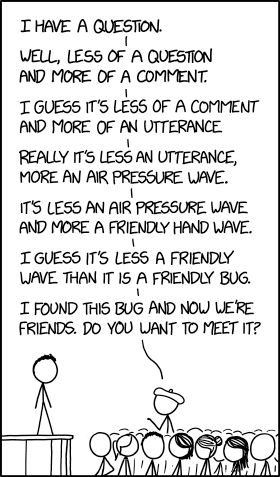Course etiquette
Asking questions
- Ask questions on the padlet here
- And in the lectures! Don’t be shy. There is no stupid question. You are doing a favour for all other silent students who are thinking the same thing
- There will be time after the lectures to ask questions privately / in groups if you so desire
- Fernando will be available to answer specific questions during his office hours: 1500-1700 on Mondays, in Chichester 1, C1-160 (first floor, up stairs from reception)

All questions are encouraged!
Attribution: xkcd 2191
Lectures
Please try and sit next to different people each week. I’ll give you some time each lecture to introduce yourself. Why?
An important part of doing a degree is meeting people from different walks of life. Maybe you’ve made a friend!
An important part of learning mathematics is getting insight into other people’s thought processes. Work on the notebooks with people. Lots of people. Give advice on what you could do. Take advice on what you couldn’t.
Notebooks
It will take you longer to complete the notebooks than the time allotted in the labs. You need to work at home, or at the labs in your free time!
You will have a much easier time if you do as much of the notebooks as possible before the labs!!!! That way, you can use the lab time usefully: asking questions to TAs, and discussing with other students.
Don’t expect to completely answer every question. If you can, you’re looking at a very high mark. Even if you can’t, you can still get a good mark in the exam. But have a go at everything!
Some questions will be hard. Others will be easy. Which ones? It’s personal to you. Different people have different backgrounds. I deliberately have not ranked the questions by difficulty. I don’t want you to immediately give up on things that are “hard”.
Answers are available. Use them wisely. The only person who loses from going to the answers without
Most importantly
What makes a good mathematician? A quality I call relaxed, creative perserverance: the ability to:
- spend a lot of time on a question without getting anxious
- enjoy the puzzling necessary for a tough question
- have an ironclad ego that doesn’t get anxious about asking stupid questions, or not being able to solve a question that others have
- not get in a hole of repeatedly trying and failing at a particular way of answering the question (usually due to anxiety and/or self-defeating time constraints)
I repeat. Do not get frustrated or anxious if things seem hard. Maths takes time to sink in. I’ve seen very good mathematicians take a lot of time to absorb “easy” content. Relaxed, creative perseverance is a much more important quality than speed.
And finally, as my old lecturer said:
MATHS IS NOT A SPECTATOR SPORT
- People often go to lectures, read answers, or listen to their friends, and leave with a pleasant sense of having understood the material.
THEY DO NOT. You only understand mathematics when you DO IT!!!!.
Hence the notebooks are by far the most important part of the material.